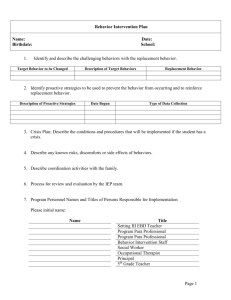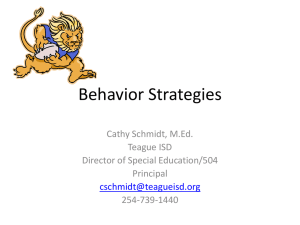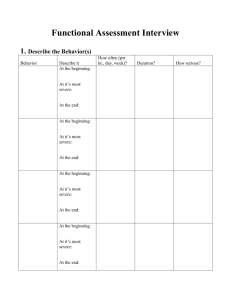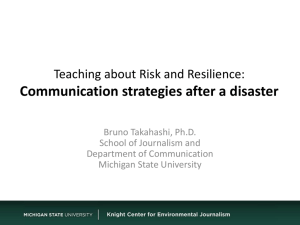Bouncing Back and Motivating Action on
advertisement
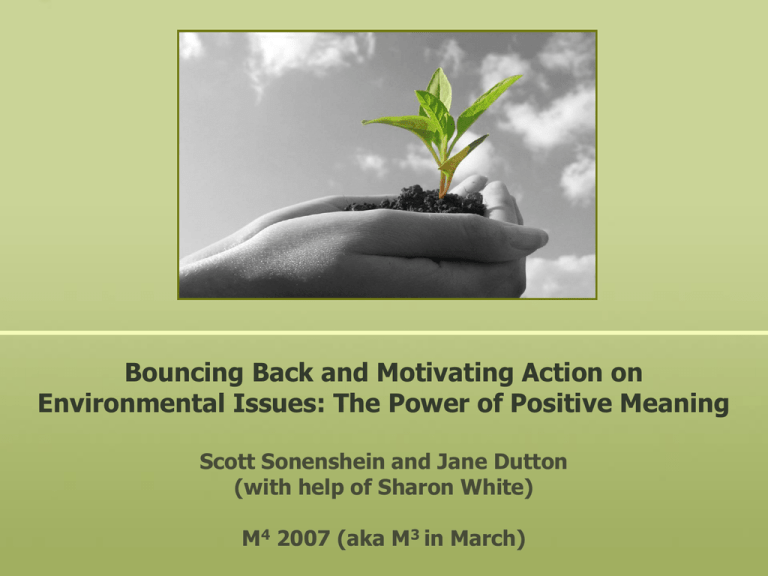
Bouncing Back and Motivating Action on Environmental Issues: The Power of Positive Meaning Scott Sonenshein and Jane Dutton (with help of Sharon White) M4 2007 (aka M3 in March) Overview • • • • • About Climate Change Research Question Motivation Two Studies Discussion (aka, We Need Your Help!) The Climate Change Issue Issue concern: The climate on earth is changing in potentially harmful ways Causes Politics Science ISSUE MEANING Players Impacts Doomsday Meanings Facts from An Inconvenient Truth • • • • • • • “The number of Category 4 and 5 hurricanes has almost doubled in the last 30 years.” “The flow of ice from glaciers in Greenland has more than doubled over the past decade.” “At least 279 species of plants and animals are already responding to global warming, moving closer to the poles.” “Deaths from global warming will double in just 25 years -- to 300,000 people a year.” “Global sea levels could rise by more than 20 feet with the loss of shelf ice in Greenland and Antarctica, devastating coastal areas worldwide. “ “More than a million species worldwide could be driven to extinction by 2050.” LINK Hopeful Meanings • Climate Change as a challenge to be overcome – ”Climate change is one of Canada's biggest challenges as we head toward the millennium. If we meet that challenge, it will ensure the continued health of our planet” (Maxwell et al. 1997a, 1). • Inconvenient truth won an Oscar! It is one of so many signs that people care about this issue and there is progress being made. • Climate change is pulling together constituencies who never saw themselves as connected before. – Evangelicals and environmentalists • Dealing with the climate change issue as a human race will prepare us to deal with even more intractable issues like human poverty. Research Question • How does the level and type of positive meaning about an issue affect individuals’ issue-related actions? Key Definitions • Issue = a cluster of events, developments or trends that are perceived as forming a common concern or common focus of attention • Positive issue meaning = beliefs, attitudes, interpretations and appraisals about the significance, implications and consequences of an issue that imply something good, desirable or beneficial for the issue interpreter or someone or something that the issue interpreter cares about • Psychological resources = “Entities that are centrally valued in their own right or act as a means to obtain valued ends” (Hobfoll, 2002, p. 307) – Motivational resources facilitate proactive action – Coping resources allow recovery from setbacks Motivation (Theoretical) • Integrate issue interpretation, change agent and socialpsychological resourcing literatures • Show how meaning creates psychological resources – Cognitive adaptation theory—benefits finding function (Taylor et al, 2000) – Motivational resources in context of strategic change implementation (Sonenshein, 2007) – Endogenous resourcefulness rooted in meaning (Dutton et al., 2006) • Explain how positive and negative meanings influence responses to issues Motivation (Practical) • Doomsday approach could be harmful – Psychologically harmful and ineffective at cultivating proactivity and resilience • Psychologically strengthen change agents – Alter their constructions of issue they are advocating 2-Part Study • Qualitative: Exploratory • Quantitative: Hypothesis-testing Research Questions (Qualitative) Issue-related Action Self-Meaning Issue Meaning Organizational Context Study 1: Qualitative My understandings of the climate change issue Beginning End My actions on the climate change issue Research Questions (Quantitative) Positive Issue Meaning Psychological Resources Hopeful meanings Motivational and coping resources Positive Expectations Belonging Transcendence Positive Affect Self-Efficacy Proactive Behaviors and Resilience Activism at work Bouncing back from setbacks Study 2: Field Experiment Hypothesis The more that individuals can construct and elaborate positive meanings about environmental issues (such as climate change), the more resourceful they are in responding to and acting on the issue, resulting in more proactive issue behaviors and greater issue resilience. Study 2: Field Experiment Pre-Survey Doomsday Meaning Resilience Proactive Behaviors PRIME Journal about The issue (1 time for 4 consecutive days) Positive Meaning (3 versions) Control Scenario -Issue setbacks -DV: proactive behaviors and resilience (behavioral) Post-Survey Resilience Proactive Behaviors Potential Manipulations for Meaning 1. Positive Expectations condition: optimism, control and confidence: “Please write about all the ways that you are optimistic about the future course of the climate change issue.” 2. Belonging condition: part of a larger community of individuals interested in issue: “Please write about all of the individuals you know who are working on the climate change issue and how you will work with them on climate change.” 3. Transcendence condition: connect to a higher purpose and meaning of the universe : “Please write about how the climate change issue will be important for connecting to a higher purpose.” 4. Control condition: generic description of the issue, followed by a broad prime: “Please write about the issue of climate change means to you.” Discussion • What is positive meaning? • How does positive meaning strengthen individuals? (i.e., mechanisms) • How should we measure proactive behaviors and resilience? (pre-post survey and behaviors) Other Areas of Help • What’s (not) interesting here? • What should we read? • Other reactions The Climate Change Issue • Contested impacts: – Current: Satellite measurements show that the waters around the world rose 3.3 millimeters per year, averaged from 1993 to 2006. The IPCC foresaw 2 millimeters per year.” (3) – Future: “Crop output could fall 5% to 10% by 2030, according to estimates by the meteorological administration.” (2) The Climate Change Issue Issue concern: The climate on earth is in decline • Contested causes: – Carbon Dioxide contributes most to Global Warming • Average global citizen emits 4.5 tons of carbon dioxide per year • Average U.S. citizen: 21 tons (1) – “Cosmic rays and water vapor, rather than carbon dioxide, (have been implicated) as the main drivers of climate change. Indeed, they have put down up to 75% of all change to these drivers.” (5) – “[Reports] have overestimated the human influence on climate change since the Industrial Revolution by at least one-third.” (4) Research Questions (Qualitative) 1. How does the construction of an issue relate to how individuals see themselves acting on that issue? 2. How does how individuals see themselves relate to how they see the issue and/or act on the issue? 3. How does how individuals see the organization context relate to how see the issue and/or act on the issue? Research Questions (Quantitative) 1. How does positive meaning explain proactive change behaviors and the resilience of change agents working on the climate change issue? 2. Which positive meanings are most potent in fostering proactive behaviors and change agent resilience? 3. What mechanisms explain the relationships among positive meaning and proactive behaviors/resilience? Study 2: Field Experiment • Provide brief description of climate change issue using the doomsday construction • Participants write four short narratives about issue • Participants receive different primes for a meaning construction • DV: Scenario depiction of issue with set-backs; measure proactive behaviors and resilience
